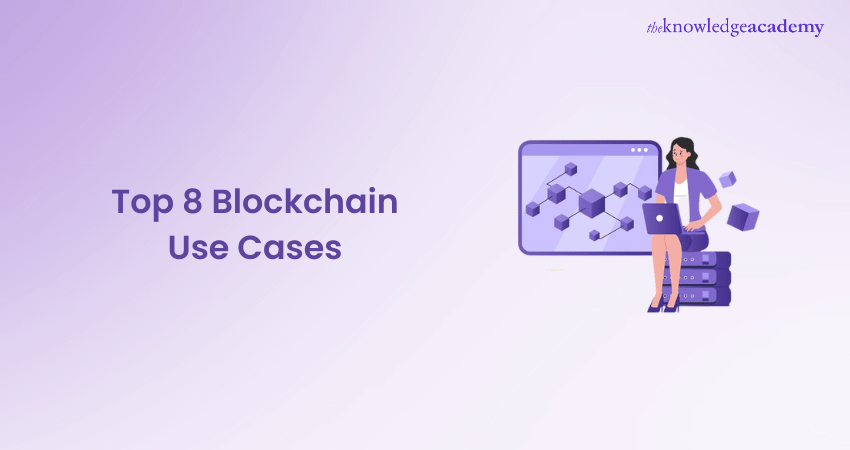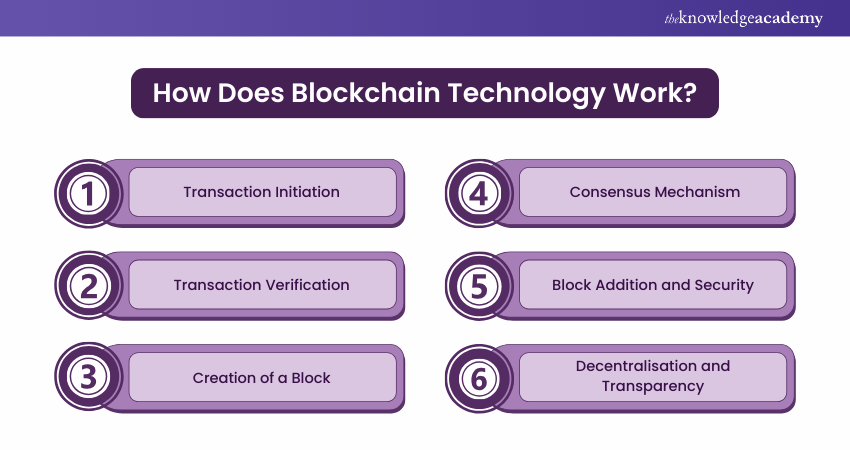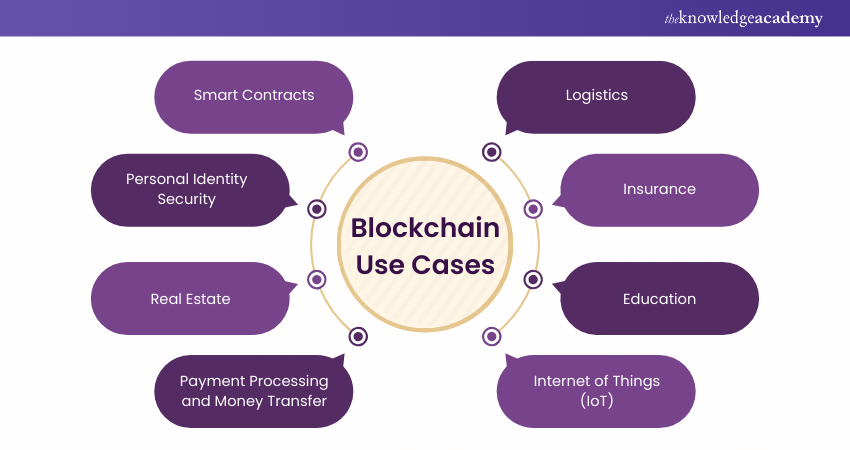We may not have the course you’re looking for. If you enquire or give us a call on + 1-866 272 8822 and speak to our training experts, we may still be able to help with your training requirements.
Training Outcomes Within Your Budget!
We ensure quality, budget-alignment, and timely delivery by our expert instructors.

Blockchain Technology is revolutionising the way we handle data and transactions. With its secure and transparent system, Blockchain is being applied in various fields, offering exciting new possibilities. In this blog, we explore the diverse Blockchain Use Cases, from streamlining financial services to enhancing supply chain transparency and securing personal identities.
Whether you're curious about its impact on healthcare or how it's transforming real estate transactions, this blog has got you covered. Join us as we delve into the fascinating world of Blockchain and discover how it's reshaping industries and creating new opportunities.
Table of Contents
1) What is Blockchain Technology?
2) How Does Blockchain Technology Work?
3) Blockchain Use Cases
a) Smart Contracts
b) Personal Identity Security
c) Real Estate
d) Payment Processing and Money Transfer
e) Logistics
f) Insurance
g) Education
h) Internet of Things (IoT)
4) Conclusion
What is Blockchain Technology?
Blockchain Technology is a system for securely recording information in a way that makes it difficult or impossible to change, hack, or cheat the system. It operates as a decentralised digital ledger that records transactions across many computers. This ensures that the data is transparent and cannot be altered without altering all subsequent records, which requires the consensus of the network.
Each transaction on a Blockchain is recorded as a "block" and linked to the previous one, forming a "chain" of blocks, hence the name "Blockchain." This chain of blocks is distributed across multiple computers (nodes), making it highly secure and resistant to tampering.
How Does Blockchain Technology Work?
Blockchain Technology works by creating a secure system for recording transactions. Here's a simple process:

a) Transaction Initiation: A user initiates a transaction, which could be anything from transferring Cryptocurrency, signing a digital contract, or recording data.
b) Transaction Verification: The transaction is broadcast to a network of computers (nodes). These nodes use algorithms to verify the transaction's validity. In the case of Cryptocurrencies, they ensure that the user has enough funds and that the transaction adheres to the system's rules.
c) Creation of a Block: Once verified, the transaction is combined with others to form a "block." This block contains a list of transactions, a timestamp, and a reference to the previous block.
d) Consensus Mechanism: All network participants agree on the validity of transactions before adding them to the Blockchain. In Proof of Work (PoW), miners solve complex puzzles to add blocks and earn rewards. In Proof of Stake (PoS), validators are chosen to add blocks based on the amount of Cryptocurrency they hold and are willing to "stake" as a guarantee.
e) Block Addition and Security: Once a block is added to the Blockchain, it is linked to the previous block, forming a chain. This linkage creates a secure and unalterable record because altering any block would require changing all subsequent blocks, which would require the consensus of the majority of the network.
f) Decentralisation and Transparency: The Blockchain is decentralised, meaning it is not controlled by a single entity but rather distributed across many nodes. This ensures transparency, as anyone can view the Blockchain and verify transactions.
Learn the principles of Ethereum with our Ethereum Developer Training – Join today!
Blockchain Use Cases
Blockchain Technology has different applications across various industries. Here are eight notable use cases:

1) Smart Contracts
Smart Contracts are digital agreements stored on a Blockchain. They automatically execute actions when specific conditions are met without needing a middleman. For example, they can release payment once a job is completed.
This technology reduces the need for intermediaries like lawyers, making transactions faster and cheaper. Smart Contracts are transparent and tamper-proof, ensuring trust between parties. They can be used in various fields, including finance, real estate, and Supply Chain Management.
2) Personal Identity Security
Blockchain Technology can enhance personal identity security by creating a secure digital identity. Individuals can control their data and decide what information to share and with whom. This helps prevent identity theft and fraud, as the data is encrypted and protected.
It simplifies verification processes for things like online banking or accessing government services. Blockchain ensures that personal information is accurate and up-to-date. By providing a secure and verifiable identity, it builds trust in digital interactions.
3) Real Estate
In real estate, Blockchain can simplify property transactions and reduce fraud. It provides a transparent record of property ownership, making it easy to verify details. Smart Contracts can automate processes like transferring ownership or handling payments. This technology reduces the need for intermediaries, saving time and money.
Blockchain can also store important documents like deeds and titles securely. It makes buying, selling, and leasing properties more efficient and trustworthy.
4) Payment Processing and Money Transfer
Blockchain can streamline payment processing and money transfers by enabling direct transactions between parties. This reduces the need for banks or other intermediaries, lowering fees and speeding up the process. It's particularly useful for international payments, which can be slow and expensive.
Blockchain transactions are secure and transparent, reducing the risk of fraud. The technology also allows for 24/7 transactions, unlike traditional banking systems. By providing a fast and secure way to transfer money, Blockchain is revolutionising the financial industry.
5) Logistics
Blockchain can improve logistics by providing a transparent and traceable record of the movement of goods. It helps companies track products from the manufacturer to the consumer, ensuring quality and authenticity. This technology can reduce errors and fraud in the supply chain.
It also simplifies the management of inventory and shipments. Companies can automate payments and delivery processes. Blockchain enhances efficiency and trust in the logistics industry.
6) Insurance
Blockchain can transform the insurance industry by providing a transparent and secure way to handle claims and policies. It can automate and speed up the claims process. This reduces the potential for fraud and human error. Additionally, Blockchain can securely store and verify customer information, ensuring that all data is accurate and up-to-date. It also allows for easy sharing of data between insurers and policyholders, improving transparency.
7) Education
In education, Blockchain can securely store academic records and certifications. Students can have a verifiable digital record of their achievements that they can share with employers or institutions. This technology helps prevent fraud and ensures that credentials are authentic.
Blockchain can also streamline administrative processes, like verifying qualifications or transferring credits. It makes the management of educational records more efficient and secure. By providing a transparent and immutable record, Blockchain builds trust in educational qualifications.
8) Internet of Things (IoT)
Blockchain can enhance the security and efficiency of the Internet of Things (IoT) devices. It provides a secure way to record data from devices, ensuring that the information is accurate and tamper-proof. This technology can automate interactions between devices, such as smart homes or connected cars.
Blockchain can also manage and track the vast amount of data generated by IoT devices. It ensures that only authorised devices and users can access sensitive data. By enhancing security and data management, Blockchain supports the growth of the IoT ecosystem.
Learn how Bitcoins work with our Bitcoin and Cryptocurrency Course – Join today!
Conclusion
We hope you read and understand Blockchain Use Cases. Blockchain helps reduce fraud, streamline processes, and enhance data integrity. From automating insurance claims to safeguarding healthcare data, the possibilities are immense. Let’s embrace the future with Blockchain.
Learn how to use Solidity to develop Smart Contracts with our Blockchain Training – Join today!
Frequently Asked Questions

Blockchain can improve Supply Chain Management by providing a transparent and tamper-proof record of each step in the supply chain. This allows companies to track products from production to delivery, ensuring authenticity and reducing fraud.

Blockchain ensures data integrity and security by storing data in a decentralised and encrypted ledger. Once data is recorded in a Blockchain, it cannot be altered without changing all subsequent blocks, which requires the agreement of the network. This makes the information tamper-proof and highly secure.

The Knowledge Academy takes global learning to new heights, offering over 30,000 online courses across 490+ locations in 220 countries. This expansive reach ensures accessibility and convenience for learners worldwide.
Alongside our diverse Online Course Catalogue, encompassing 17 major categories, we go the extra mile by providing a plethora of free educational Online Resources like News updates, Blogs, videos, webinars, and interview questions. Tailoring learning experiences further, professionals can maximise value with customisable Course Bundles of TKA.

The Knowledge Academy’s Knowledge Pass, a prepaid voucher, adds another layer of flexibility, allowing course bookings over a 12-month period. Join us on a journey where education knows no bounds.

The Knowledge Academy offers various Blockchain Training, including Ethereum Developer Training, Blockchain Training and Bitcoin and Cryptocurrency Course. These courses cater to different skill levels, providing comprehensive insights into various Blockchain Developer Skills.
Our Advanced Technology Blogs cover a range of topics related to Blockchain Training, offering valuable resources, best practices, and industry insights. Whether you are a beginner or looking to advance your Blockchain knowledge, The Knowledge Academy's diverse courses and informative blogs have you covered.
Upcoming Programming & DevOps Resources Batches & Dates
Date
 Blockchain Training Course
Blockchain Training Course
Thu 23rd Jan 2025
Thu 27th Mar 2025
Thu 15th May 2025
Thu 17th Jul 2025
Thu 25th Sep 2025
Thu 13th Nov 2025







 Top Rated Course
Top Rated Course



 If you wish to make any changes to your course, please
If you wish to make any changes to your course, please


